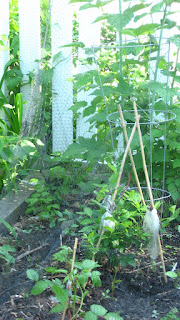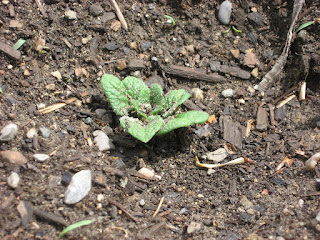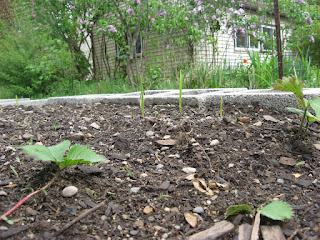First, you want to know a few things:
- How much space are you working with? Get out that measuring tape, yard stick, or ruler and size up your space! If you have any kind of simple shaped patio (a square or a rectangle), you can just measure the length of the outdoor space by the width. If you have some crazy angles going on, you might have to get a little creative. There are some formulas out there on how to calucate that area.
- What hardiness zone are you in? Depending on where you live and the climate and average temperatures, there are guidelines on when it's best to plant what. Find out your zone here: http://www.usna.usda.gov/Hardzone/ushzmap.html
- How much light does your outdoor space get? 6 hours of daylight? 8 hours of daylight? Partial sun? Full Shade? Depending on the type of light you get and the amount, certain plants might be off limits to you, or might be really hard to grow succesfully. Check that out!
Second, envision what kind of space you want. For this part of the project, I find it helpful to browse through gardening magazines and websites. Get a vision of what kind of space you'd like, and also, what you want the function of that space to be. Are you a reader? Maybe you want a little chair out on your patio, and just a few flowers in pots to brighten up your reading space. Are you a tomato-lover? If so, maybe you want to get some pots or something like the Topsy Turvy Upside-Down Tomato Planter
- Make sure you check out the light and space requirements for each plant you're planning on bringing home. Tomatoes need heat and light and shouldn't be planted until it's summer- June 1st is a safe date for zone 5b. Leafy greens can be planted earlier, as well as onions, potatoes, and garlic!
Fourth, get those plants, and get some soil to keep them snug! There are a variety of places to get plants for your container garden. A lot of the big boxes stores have pretty flowers and some edible plants as well, and they are usually fairly good quality. I prefer supporting a local farm or nursery if possible- you can easily google "family farm" or "local vegetable plants" or "nursery + my city". No matter where you get your plants, just make sure you check the quality. In general, plants should have good color and turgidity (stems should be strong and upright and plant should not be wilting).
Fifth, plant those babies! Once you've got the plants, the soil, and you've got the containers, you are ready to plant! Fill the pots with enough soil that the plants is at a good height within the pot. When you're planting, for the most part, you don't want to drown the plant in soil. There's a good balance between making sure the roots are covered up and making sure the stem is not submerged in soil. The plant should have a tag that might give you some guidelines as well. You might have found plants that are already in cute containers to begin with, and in the case you don't even need to transplant anything! Make sure you water the plant well once it is settled into it's pot so it will thrive in it's new home. If you want to add a little fertilizer you can, but make sure you read the label carefully, and only apply the suggested amount- a teeny tiny bit! Fertilizer is a whole different lesson, folks :)
Woohoo! You now have a delightful container garden, reading area, shade garden, veggie plot, etc. Relax, enjoy, and don't forget to water! :)
























